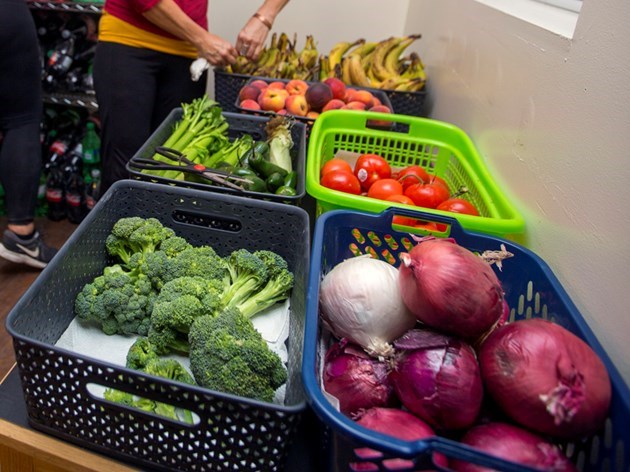BOW VALLEY – A new report on food insecurity in the Bow Valley during the COVID-19 pandemic makes nine recommendations to help improve local food systems and access to food.
Among the Bow Valley Food Alliance (BVFA) report’s recommendations were developing a municipally led and regional emergency food response plan, the creation of an emergency food fund, building Bow Valley food hubs and supporting local food producers.
“The intention was to share some of the things we had learned during the beginning of COVID," said Lauren Kepkiewicz, a director on the BVFA board and one of the authors of the report. "A variety of board members worked together to put together some of those key lessons. We also spoke with partners and people to see what resonated with them.”
The 16-page report focused on March 2020 to June 2021, but emphasized food insecurity struggles in the valley that existed before COVID-19.
The BVFA report noted before the pandemic, Alberta Health Services Cost of Healthy Eating in Alberta report showed the cost of food in Canmore and Banff averaged about $1,180 per month for a family of four. The provincial average was roughly $1,090.
Before the pandemic, the valley also had several food support systems such as food rescues, community meals and school breakfast and lunch programs.
But when the COVID-19 pandemic was declared in March 2020, the report emphasized the BVFA received an overwhelming number of queries for support from local organizations, businesses and informal groups.
Among the issues found at the outbreak of the pandemic were unemployment, housing and food insecurity, especially as unemployment soared in the valley.
“The work of the Bow Valley Food Alliance really focuses on listening to community members and community groups and supporting, connecting and coordinating initiatives that are ongoing and trying to identify and fill any gaps in those services,” Kepkiewicz said.
“We also really try to highlight the food-related challenges that also go beyond access to food and affordability. That’s a key challenge in the valley.”
Kepkiewicz said building and establishing relationships is essential to help communities deal with emergencies that are unexpected such as COVID-19.
“We definitely saw old relationships strengthened, but also new relationships formed. I’d really love to see those relationships continue once the pandemic ends," she said.
As part of its work, a survey of 259 respondents was completed by BVFA in the summer of 2020, showing more money was being spent on food and there were more concerns about accessing food.
The survey aimed to learn more about people’s relationship with food, but specifically how it had changed during COVID – not only for challenges that were being faced, but also opportunities that may have arisen.
The beginning of the pandemic also led to supply chain issues, volunteer-run programs temporarily closing and funding drying up for many organizations shut out of COVID-19 available supports.
However, between January 2020 and June 2021, the BVFA received $220,500 in grants from the United Way, Community Food Centres Canada, Banff Canmore Community Foundation and Bow Valley Christmas Spirit Campaign.
According to the report, BVFA partnered with 34 groups such as Banff Child Care Centre, Family Resource Network and Iyahrhe Nakoda Food Bank Society.
Of the grant money, 31 per cent was dolled out to honorariums and program services, 28 per cent to small grants and 15 per cent for prepared meals. The remainder went to food and food hampers, grocery gift cards, local food producers and other programs.
“There is no one solution that will solve hunger and inequitable globe, national and regional food systems,” the report stated. “Rather, progress will require multi-pronged solutions that occur across various jurisdictions and scales.”
The BVFA, a group of individuals and organizations aimed at addressing and advocating food concerns in the Bow Valley, was created in 2016.
The organization’s food charter looks to strengthen local food systems and programs to help address food affordability concerns and accessibility.
Improvement District No. 9 first signed on in April 2020 and the Town of Banff joined last September.
The BVFA appeared at Canmore’s Jan. 18 committee of the whole meeting and council decided at its Feb. 3 meeting to have staff return with more information on expectations and how it would impact future decision-making of council before signing.
This past summer, the BVFA released two research reports that focused on the strengths and weaknesses of food security in the Town of Canmore and the MD of Bighorn.
The reports gave a series of recommendations to both municipalities to work improve food security in each community. A similar report was completed in 2019 for the Town of Banff.
“During this time, it became increasingly clear that we need regional food systems that do not rely on global supply chains, charity and volunteers,” the report stated. “We believe that food sovereignty is essential for creating these kinds of vibrant food systems that can withstand unexpected shocks.”
Among the main recommendations were creation of closer relationships to weather any storm such as floods or COVID-19.
“One of the overarching recommendations that comes out of our experience of COVID is municipalities, grassroots groups, non-profit organizations and community members to develop a regional emergency coordination plan,” Kepkiewicz said.
“These relationships, networks and having a plan in place are really important in helping to prepare communities for dealing with emergencies.”
The report was written by Kepkiewicz, Jill Harrison and the BVFA board members, with contributions from Avni Soma, Cody Alba, Deb Grady and Marie-Eve Marchand.




